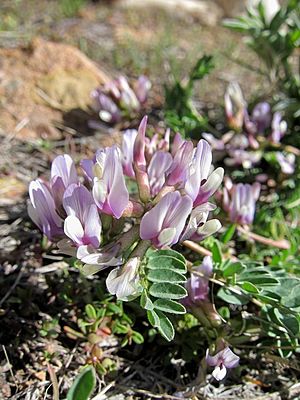Astragalus iodanthus facts for kids
Quick facts for kids Astragalus iodanthus |
|
|---|---|
 |
|
| var. iodanthus | |
| Conservation status | |
| Scientific classification |
|
| Kingdom: | Plantae |
| Clade: | Tracheophytes |
| Clade: | Angiosperms |
| Clade: | Eudicots |
| Clade: | Rosids |
| Order: | Fabales |
| Family: | Fabaceae |
| Genus: | Astragalus |
| Species: |
A. iodanthus
|
| Binomial name | |
| Astragalus iodanthus S.Wats.
|
|
| Script error: The function "autoWithCaption" does not exist. | |
Script error: No such module "Check for conflicting parameters".
The Astragalus iodanthus, also known as the Humboldt River milkvetch or violet milkvetch, is a type of flowering plant. It belongs to the legume family, called Fabaceae. This plant naturally grows in the western parts of the United States. You can find it in states like California, Idaho, Nevada, Oregon, and Utah. It likes to grow on hills and in valleys. It prefers sandy or volcanic soils that don't have many other plants, often in areas with sagebrush.
Contents
What the Humboldt River Milkvetch Looks Like
This plant is a perennial herb, which means it lives for many years. It grows several stems that lie flat on the ground. These stems can be up to 40 centimeters (about 16 inches) long.
Leaves and Flowers
The leaves of the Humboldt River milkvetch are compound. This means each leaf is made up of smaller parts called leaflets. There are usually 9 to 21 leaflets on each leaf. These leaflets can be rounded or shaped like a teardrop, and each one is about 1.8 centimeters (less than an inch) long.
The flowers grow in a cluster called a raceme. A raceme is a type of flower stalk where flowers grow along a central stem. There can be up to 25 flowers in one cluster. When they first bloom, the flowers are close together. As they get older, they spread out more. The flowers can be reddish-purple or white to cream colored. The tip of the bottom petal, called the keel petal, often has a purple color.
Fruit Pods
After the flowers bloom, the plant produces fruit. The fruit is a type of legume pod. These pods can grow up to 4 centimeters (about 1.5 inches) long. As the pods get older, they turn dark and often have spots. Their texture changes from papery to a bit leathery.
Different Types of Humboldt River Milkvetch
There are two main varieties (or slightly different types) of this plant:
- var. diaphanoides is also known as the snake milkvetch. This variety has more rough hairs on it. You can especially see these hairs along the edges of its leaves and on the main vein of the leaf.
- var. iodanthus is the other variety. It has fewer hairs than diaphanoides. Its rough hairs are mostly found on the flower clusters.
 | Victor J. Glover |
 | Yvonne Cagle |
 | Jeanette Epps |
 | Bernard A. Harris Jr. |


